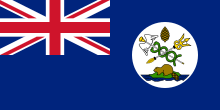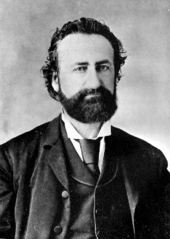Vancouver Island (Colony)
Vancouver Island (officially: Island of Vancouver and its Dependencies ) was a British crown colony in the west of British North America that existed from 1849 to 1866 . It included Vancouver Island and the Gulf Islands . The capital was Victoria . In 1866, Vancouver Island was merged with the mainland colony of British Columbia to form the United Colonies of Vancouver Island and British Columbia .
history
Formation of the colony
Captain James Cook landed in Nootka Sound on March 31, 1778 and took Vancouver Island for Great Britain . The British East India Company set up a trading post in the village of Yuquot on the offshore Nootka Island . After the Nootka Convention was signed, Spain abandoned its claims to Vancouver Island and the surrounding islands in 1794. It was not until 1843 that the Hudson's Bay Company (HBC) established the first permanent settlement with Fort Camosun - the city of Victoria developed from the trading post near a village of the Songhees .
After the Oregon Compromise of 1846, which set the 49th parallel as the border with the United States , the HBC feared economic disadvantages if its western headquarters remained stationed in Fort Vancouver south of the border and therefore moved it to Victoria in 1849. Branch manager James Douglas was commissioned to manage all HBC activities west of the Rocky Mountains from there.
This new development induced the Colonial Ministry to raise the legally disorganized territory to the status of a crown colony on January 13, 1849 . Immediately afterwards, the colony was leased to HBC for a period of ten years and Douglas was given the task of promoting British settlement. Richard Blanshard was appointed governor and arrived in Victoria in March 1850. There was no civil administration, no police, no militia and almost every British colonist was an employee of the HBC. Blanshard found that the HBC controlled all areas of life and Douglas had practically all power. After only a year he returned to England, whereupon the Colonial Ministry appointed Douglas as the new governor.
Government of Governor James Douglas
Douglas' dual role as the local agent for a private company and as the civilian governor of a colony leased from the same company did not cause problems in the early days. He set up a militia and promoted immigration. By the mid-1850s, the non-native population rose to around 500 , sawmills and coal mines sprang up around Nanaimo and Fort Rupert (now Port Hardy ). Douglas advised the British government on building a naval base near what is now Esquimalt in order to keep Russian and American expansionism in check.
Colonial officials in London hampered Douglas' settlement efforts by keeping land prices high. This was to encourage the immigration of wealthy Britons who brought their own labor. The population growth was correspondingly slow and many landless workers settled in order to get free land in the United States or to seek their fortune in the California gold rush . A copy of the British class system emerged on Vancouver Island, with the upper class rejecting progressive ideas such as public schools, land reform and representative democracy.
At the time the colonies were founded, the First Nations population on Vancouver Island was about 30,000. Douglas negotiated 14 contracts with different tribes. With these “Douglas Treaties”, the tribes were obliged to give up all land claims within a certain area, with the exception of the villages and the cultivated land. They also had the right to hunt and fish on unclaimed land. In return, the tribes received a one-off payment of a few shillings .
As the settlement progressed, so did resistance to the HBC's economic and civil monopoly. Several petitions were sent to the Colonial Ministry, one of which led to the establishment of a colonial council in 1855. Little changed at first, as only a few dozen men owned more than 20 acres and were therefore eligible to vote. In addition, most MPs were employees of the HBC. Gradually, however, the electorate expanded and the council began to demand greater leverage over the administration of the colony, criticizing Douglas' apparent conflict of interest .
In 1858, rumors spread that gold had been found on the Thompson River . Within a short period of time ten to twenty thousand men flocked to New Caledonia (as the mainland was then called) and Victoria was transformed into a tent city with prospectors , traders, real estate agents and speculators in the wake of the Fraser Canyon gold rush . Governor Douglas, who had no legal authority whatsoever in New Caledonia, stationed a gunboat on the lower reaches of the Fraser River to persuade the mostly US prospectors who wanted to travel upriver to pay royalties.
To ensure jurisdiction and to anticipate possible claims of the HBC on the mineral resources, the British Parliament declared New Caledonia on August 2, 1858 a colony of British Columbia . Colonial Secretary Edward Bulwer-Lytton appointed James Douglas governor of the new colony - on condition that he gave up his ties to the HBC. Douglas accepted this but preferred to rule both colonies from Victoria.
The remainder of Douglas' tenure as governor of Vancouver Island was marked by accelerated economic expansion and settlement. This was accompanied by increasingly vehement calls for a merger of the two colonies and the introduction of a government with extensive self-administration competence. An imprecise formulation in the Oregon Compromise led to the Swine Conflict in 1859 , when British and American troops faced each other on San Juan Island ; This border conflict could not be resolved until 1872 when the island was added to the USA.
In 1862, Victoria experienced another economic boom during the Cariboo gold rush , as most prospectors began their journey from here. The increasingly violent disputes between Douglas and the reformers, above all Amor De Cosmos , as well as the desire of the colonists in British Columbia to have their own governor in their capital New Westminster , led to Douglas being recalled by the Colonial Ministry in 1864.
Association with the colony of British Columbia
James Douglas was followed by the experienced colonial official Arthur Edward Kennedy , who had previously served as governor in Gambia , Sierra Leone and Western Australia . The population welcomed the appointment of a governor who had no ties to the HBC. But the Colonial Council met Kennedy with suspicion, fearing that Vancouver Island would lose influence over the mainland colony. The council opposed the request of the Colonial Ministry to make a financial contribution to the civil list in return for the control of the extensive crown land . The MPs also temporarily withheld Kennedy's salary until they could get their way. Part of the council also opposed Kennedy's plan to merge the two colonies. Only when the opponents could be convinced that a merger would bring economic benefits did they give up their resistance.
In the meantime, Kennedy had some success in balancing out the social differences that had developed during HBC hegemony. In 1865 he passed a law to fund public schools, reformed the administration, introduced the external review of the colonial budget and improved tax collection. However, he continued to fail when trying to get the council to contribute to the civil list. He was also unable to protect the rights and welfare of the First Nations adequately . Despite his sympathy for the fate of the native Indians, Kennedy ordered a punitive expedition in 1864 against the Ahousaht on Clayoquot Sound , which had ambushed a merchant ship and killed its crew.
After the colonial budget showed a large deficit in 1865 and the council was unable or unwilling to make proposals for new revenue, Kennedy was barely able to keep the administration operational. On August 6, 1866, the merger to form the United Colonies of Vancouver Island and British Columbia took place .
Vancouver Island Governors
- 1849-1851: Richard Blanshard
- 1851–1864: James Douglas
- 1864–1866: Arthur Edward Kennedy
literature
- Jean Barman: The West beyond the West - A History of British Columbia. University of Toronto Press, Toronto 2007, ISBN 0-80209-495-3 .
- Daniel Francis: The Encyclopedia of British Columbia. Harbor Publishing, Pender Harbor 2000, ISBN 1-55017-200-X .




